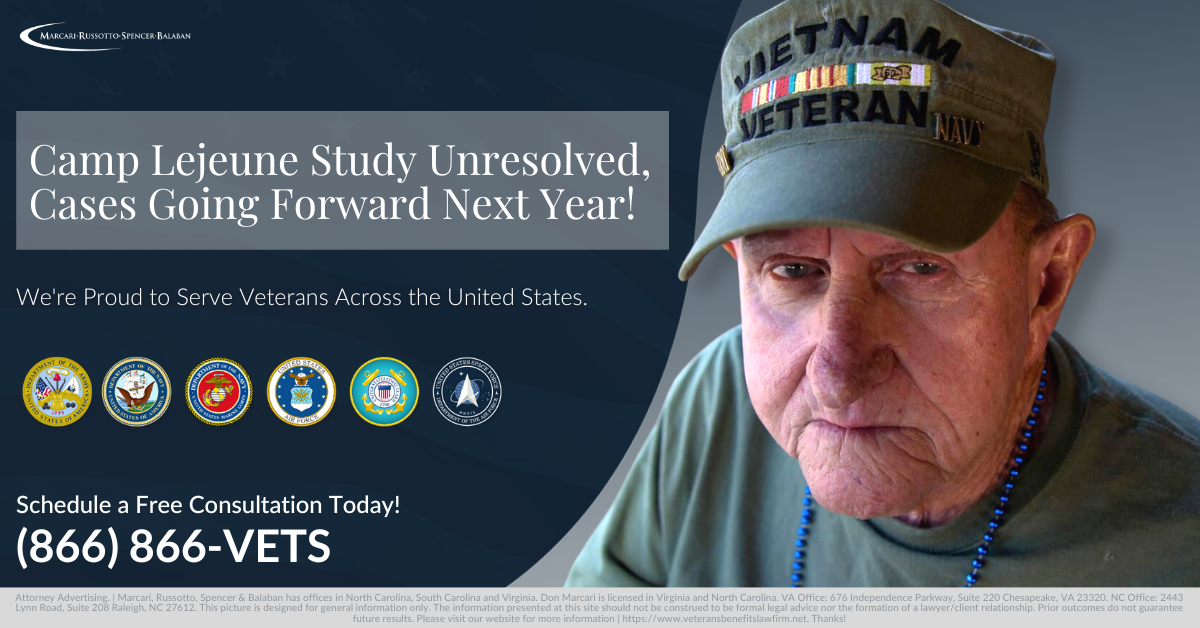As the first cases alleging harm from Camp Lejeune contamination near court proceedings, the eagerly awaited disclosure of a pivotal cancer incidence study remains elusive.
Despite the study concluding months ago, the public has yet to see the results of this landmark investigation into cancers among thousands exposed to tainted water at the Marine Corps base from the 1950s to the 1980s.
Initiated in 2015 by an agency within the Centers for Disease Control and Prevention (CDC), the comprehensive “cancer incidence study” underwent external peer review clearance in April.
However, the findings have not been made public, raising concerns about the potential impact on more than 1,100 lawsuits seeking compensation for deaths and illnesses.
These lawsuits are progressing toward action in federal court in North Carolina, aligning with the intent of a law enacted in August 2022.
Simultaneously, the Navy Judge Advocate General’s Office faces an influx of 117,000 damage claims, representing the initial step Camp Lejeune victims must take before pursuing federal court action.
In a court filing last month, the Justice Department noted that these claims collectively request an astounding $3.3 trillion in damages.
To substantiate their claims successfully, plaintiffs must demonstrate spending over a month at Camp Lejeune during the water contamination period spanning from 1953 to 1987.
Additionally, they must illustrate the impact of various illnesses linked to the pollution, including kidney, liver and bladder cancer, leukemia, and Parkinson’s disease.
However, challenges arise for diseases such as breast cancer and multiple myeloma, which are not as strongly correlated with the contaminants found at the Marine base.
This disparity prompted the CDC to dedicate over seven years to tracking cancer cases among those who lived at the base, examining cancer registries across all U.S. states and territories.
This unprecedented effort aimed to address the absence of a thorough national cancer registry.
The extensive study, residing within the Agency for Toxic Substances and Disease Registry (ATSDR), an agency within the CDC, remains undisclosed.
Camp Lejeune was designated a Superfund site in 1989 under the federal Superfund law, and the study’s importance in understanding health impacts from toxic waste is crucial.
Marine Corps veteran Jerry Ensminger, a key figure leading efforts to seek damages from the Defense Department since the 1990s, expressed grave concerns.
He stated, “Unfortunately, if they’re successful in slow-rolling this report, it will be the obituary for a lot of these people… as far as their cases go.”
Ensminger emphasized that the absence of key scientific evidence could lead to the demise of cases, characterizing the situation as unacceptable.
A CDC spokesperson, responding via email, stated that the studies are in the beginning phase of the external peer review process, providing limited insight into the reasons behind the delay.
The legal landscape surrounding Camp Lejeune contamination stems from the 2022 PACT Act, offering compensation to service members exposed to toxic air from burn pits used by the military overseas.
This legislation includes provisions allowing those harmed at Camp Lejeune, where water contained a variety of contaminants for decades, to file damage claims with the Navy.
If these claims remain unresolved after six months, individuals have the option to file lawsuits in federal court in North Carolina.
Amid a growing number of claims, the Department of Justice (DOJ) and the Navy proposed settlements in September.
The “elective option” allows those contracting any of five “Tier 1” diseases — kidney cancer, liver cancer, non-Hodgkin lymphoma, leukemia, or bladder cancer — to be eligible for compensation.
The amount varies based on the duration of exposure: $150,000 for less than a year at Camp Lejeune between 1953 and 1987, $300,000 for one to five years, and $450,000 for over five years.
For individuals with “Tier 2” diseases — multiple myeloma, Parkinson’s disease, kidney disease or end-stage renal disease, and systemic sclerosis or scleroderma — compensation ranges from $100,000 to $400,000, contingent on the time spent at the base. In cases of premature death from the diseases, relatives are entitled to an additional $100,000.
The ongoing legal proceedings involve the selection of approximately 100 “bellwether” cases.
These cases will be heard by four U.S. District Court judges in North Carolina starting early next year. The outcomes will play a pivotal role in shaping decisions for similar lawsuits in the subsequent months.
While attorneys for plaintiffs with Tier 1 diseases and federal health officials assert abundant scientific evidence supporting these claims, fewer studies establish links to Tier 2 diseases.
The ATSDR describes these illnesses as having “equipoise,” where the evidence is sufficient to conclude a causal relationship is at least as likely as not, but not sufficient to definitively establish a causal relationship.
Certain illnesses, including breast cancer, fall below the “equipoise” threshold due to fewer studies linking them to the contaminants found at Camp Lejeune.
The pollutants included solvents such as trichloroethylene and tetrachloroethylene, benzene, and vinyl chloride, all recognized as toxic.
The crucial role of the cancer incidence study becomes evident for victims of diseases ranked as Tier 2 or below.
Initiated in 2015, the study followed a comparison study published a year earlier, contrasting individuals at Camp Lejeune with a similar population at Camp Pendleton in California, where the water was uncontaminated.
The earlier study revealed a significantly higher mortality rate for those at Camp Lejeune due to various types of cancer.
In the cancer incidence study, scientists at the ATSDR compiled service records for military personnel at both Camp Lejeune and Camp Pendleton between 1975 and 1985, as earlier records were unavailable.
Subsequently, they searched for cancer cases among these Veterans using registries in all 50 states and the U.S. territories.
An external peer review of the study was completed in April by a panel of outside experts, as conveyed to members of ATSDR’s Camp Lejeune Community Assistance Panel by the study’s chief scientist, Frank Bove, in May. Jerry Ensminger, whose daughter Janey died of leukemia in 1985, nine years after she was conceived at Camp Lejeune, has attended every quarterly panel meeting for the past 14 years.
However, the last update on the study was provided during the August meeting when Ensminger inquired about its status.
He was informed that several comments had been submitted to the agency after the initial peer review, and these were still under review.
Ensminger is adamant that the study is being deliberately withheld by the DOJ and the Navy, suggesting potential interference in its release.
He suspects “shenanigans” at CDC headquarters in Atlanta and accuses the ATSDR and CDC of acting as a “blocking agent” for the Justice Department.
Spokesmen for both the Navy and the Justice Department declined to comment on pending litigation.
Ensminger’s accusations underscore a broader concern about the potential misuse of government agencies that are intended to protect public health but may be perceived as obstructing justice to shield the government from legal consequences.

Iraq War Fund: Important Information to Know!
Listen to a Full Summary of This Blog Post! What is The Iraq War Fund? The Iraq War Fund, established under the Anti-Terrorism Act, works








